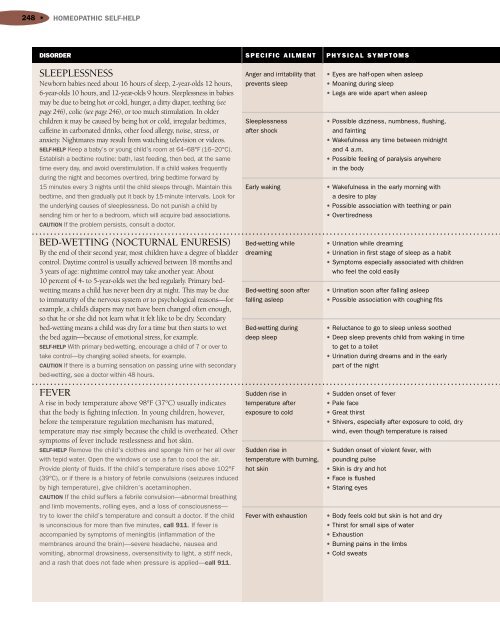Encyclopedia of Homeopathy
Encyclopedia of Homeopathy
Encyclopedia of Homeopathy
Create successful ePaper yourself
Turn your PDF publications into a flip-book with our unique Google optimized e-Paper software.
248 • HOMEOPATHIC SELF-HELPDISORDERSLEEPLESSNESSNewborn babies need about 16 hours <strong>of</strong> sleep, 2-year-olds 12 hours,6-year-olds 10 hours, and 12-year-olds 9 hours. Sleeplessness in babiesmay be due to being hot or cold, hunger, a dirty diaper, teething (seepage 246), colic (see page 246), or too much stimulation. In olderchildren it may be caused by being hot or cold, irregular bedtimes,caffeine in carbonated drinks, other food allergy, noise, stress, oranxiety. Nightmares may result from watching television or videos.SELF-HELP Keep a baby’s or young child’s room at 64–68°F (16–20°C).Establish a bedtime routine: bath, last feeding, then bed, at the sametime every day, and avoid overstimulation. If a child wakes frequentlyduring the night and becomes overtired, bring bedtime forward by15 minutes every 3 nights until the child sleeps through. Maintain thisbedtime, and then gradually put it back by 15-minute intervals. Look forthe underlying causes <strong>of</strong> sleeplessness. Do not punish a child bysending him or her to a bedroom, which will acquire bad associations.CAUTION If the problem persists, consult a doctor.BED-WETTING (NOCTURNAL ENURESIS)By the end <strong>of</strong> their second year, most children have a degree <strong>of</strong> bladdercontrol. Daytime control is usually achieved between 18 months and3 years <strong>of</strong> age: nighttime control may take another year. About10 percent <strong>of</strong> 4- to 5-year-olds wet the bed regularly. Primary bedwettingmeans a child has never been dry at night. This may be dueto immaturity <strong>of</strong> the nervous system or to psychological reasons—forexample, a child’s diapers may not have been changed <strong>of</strong>ten enough,so that he or she did not learn what it felt like to be dry. Secondarybed-wetting means a child was dry for a time but then starts to wetthe bed again—because <strong>of</strong> emotional stress, for example.SELF-HELP With primary bed-wetting, encourage a child <strong>of</strong> 7 or over totake control—by changing soiled sheets, for example.CAUTION If there is a burning sensation on passing urine with secondarybed-wetting, see a doctor within 48 hours.FEVERA rise in body temperature above 98°F (37°C) usually indicatesthat the body is fighting infection. In young children, however,before the temperature regulation mechanism has matured,temperature may rise simply because the child is overheated. Othersymptoms <strong>of</strong> fever include restlessness and hot skin.SELF-HELP Remove the child’s clothes and sponge him or her all overwith tepid water. Open the windows or use a fan to cool the air.Provide plenty <strong>of</strong> fluids. If the child’s temperature rises above 102°F(39°C), or if there is a history <strong>of</strong> febrile convulsions (seizures inducedby high temperature), give children’s acetaminophen.CAUTION If the child suffers a febrile convulsion—abnormal breathingand limb movements, rolling eyes, and a loss <strong>of</strong> consciousness—try to lower the child’s temperature and consult a doctor. If the childis unconscious for more than five minutes, call 911. If fever isaccompanied by symptoms <strong>of</strong> meningitis (inflammation <strong>of</strong> themembranes around the brain)—severe headache, nausea andvomiting, abnormal drowsiness, oversensitivity to light, a stiff neck,and a rash that does not fade when pressure is applied—call 911.SPECIFIC AILMENTAnger and irritability thatprevents sleepSleeplessnessafter shockEarly wakingBed-wetting whiledreamingBed-wetting soon afterfalling asleepBed-wetting duringdeep sleepSudden rise intemperature afterexposure to coldSudden rise intemperature with burning,hot skinFever with exhaustionPHYSICAL SYMPTOMS• Eyes are half-open when asleep• Moaning during sleep• Legs are wide apart when asleep• Possible dizziness, numbness, flushing,and fainting• Wakefulness any time between midnightand 4 a.m.• Possible feeling <strong>of</strong> paralysis anywherein the body• Wakefulness in the early morning witha desire to play• Possible association with teething or pain• Overtiredness• Urination while dreaming• Urination in first stage <strong>of</strong> sleep as a habit• Symptoms especially associated with childrenwho feel the cold easily• Urination soon after falling asleep• Possible association with coughing fits• Reluctance to go to sleep unless soothed• Deep sleep prevents child from waking in timeto get to a toilet• Urination during dreams and in the earlypart <strong>of</strong> the night• Sudden onset <strong>of</strong> fever• Pale face• Great thirst• Shivers, especially after exposure to cold, drywind, even though temperature is raised• Sudden onset <strong>of</strong> violent fever, withpounding pulse• Skin is dry and hot• Face is flushed• Staring eyes• Body feels cold but skin is hot and dry• Thirst for small sips <strong>of</strong> water• Exhaustion• Burning pains in the limbs• Cold sweats
















